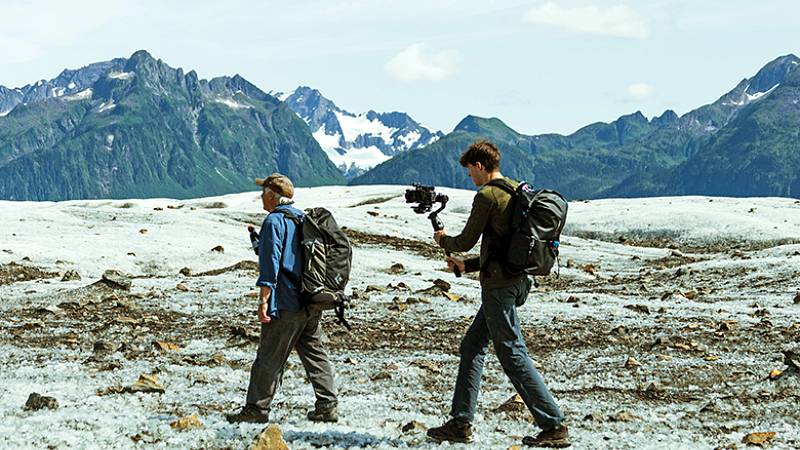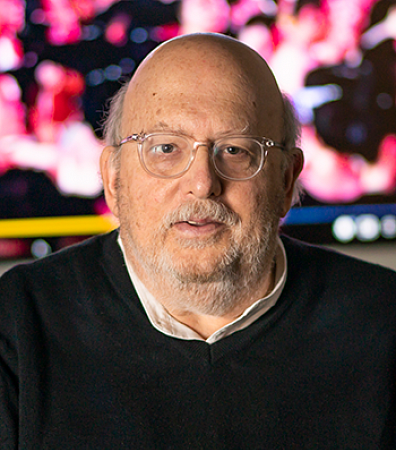
As a photographer and videographer for the University of Oregon, Marin Stuart ’21 understands the challenges of creating an impactful video.
But it wasn’t until she took Oscar- and Emmy-winning documentary and film studies professor Mitchell Block’s class as a UO School of Journalism and Communication (SOJC) student that she learned what it really takes to make an engaging documentary.
“It was a great experience for what the real world would be like if you wanted to become a documentary filmmaker,” Stuart said. “You need to go find the story and capture it. If you’re a one-man band, you’re figuring out what that is and you’re doing it in your own way.”
Stuart’s short documentary focused on Oregon’s Enchanted Forest theme park that recently suffered devastating setbacks: The family that owns the park had to temporarily close it due to COVID-19 and then lost two family members in the Beachie Creek Fire.
One of the challenges Stuart faced was how to make a closed theme park look interesting while telling an emotionally captivating story. As she was working on her film, she turned to Block and Rebecca Cammisa, an Emmy-winning and two-time Oscar-nominated documentary filmmaker who co-taught Block’s class over Zoom from her home in New York.
“They were pretty instrumental in helping with the emotional element. They would say, I think you should pull this out longer or get rid of this shot, or your editing needs to be stronger,” Stuart said. “Rebecca was really good at being brutally honest with edits.”

Professional guidance from masters of the craft is a cornerstone of the SOJC’s documentary program.
“We can have a world-class documentary program in Eugene because of Zoom,” said Block, who joined the SOJC in 2020 as the Jon Anderson Endowed Chair in Journalism and Communication. “When the students are editing, they have Oscar-level editors. When they’re working on their films, they have Oscar-level directors and filmmakers involved. That makes this program unique, as most programs don’t have working filmmakers of this caliber.”
Because students were remote and not all had access to their own equipment or SOJC equipment, Block encouraged them to use their iPhones.
“I don’t push high technology,” Block said. “I don’t care about cameras. I don’t care about anything except telling stories, and you can tell stories with an iPhone.”
Trey Kodman ’21 appreciated Block’s understanding that not all students have the same resources.
“He was very receptive to everybody bringing whatever they can to the table,” Kodman said. “I was inspired by his availability to be open and receptive to every student’s perspective on their project.”
While in the class, Kodman learned more about how to approach subjects, especially when it came to working with subjects who are underage.
“I asked Mitchell what are the stipulations for kids signing off their rights to edit footage with them in it,” Kodman said. “Mitchell said, ‘Don’t do that,’ because their parental guardians can have a problem with that. They had the insight to the inner workings of how to approach touchy subjects.”
Block and Cammisa understood the time constraints students were under to create a short documentary in 10 weeks: They must find and pitch the story, gather footage and edit everything into a five- to six-minute documentary. Class time was often dedicated to watching rough cuts and discussing how they could improve their work.
“The point isn’t to make a completed piece necessarily,” Cammisa said. “In Week 10, we’re asking you: What are the mistakes you’re learning from?”
Block wants to grow the documentary film program by adding classes that build off one another so students can have more time to develop their films. He also wants to continue bringing in visiting professors and working filmmakers to help students build their skill sets and industry connections that will help them get jobs after graduation.
“I want to see everyone grow, and I want to help people find their voice,” Block said. “That, to me, is not academic. It’s artistic, so it’s very exciting.”
—By Alli Weseman, class of ’22, with additional reporting by Shannon Golden
Alli Weseman (she/her/hers) is a second-year student in the SOJC’s Multimedia Journalism Master’s program in Portland. She has freelanced for Portland Monthly Magazine and hopes to work in a newsroom one day. You can find more of Alli’s work at alliwesemanphotography.com.
